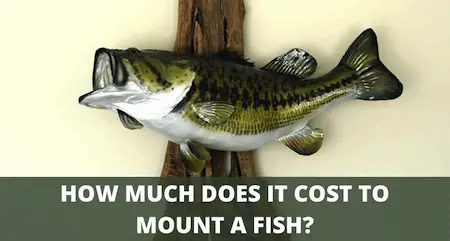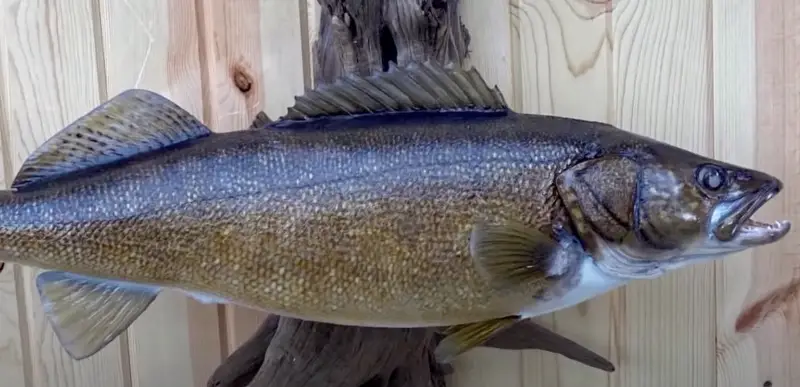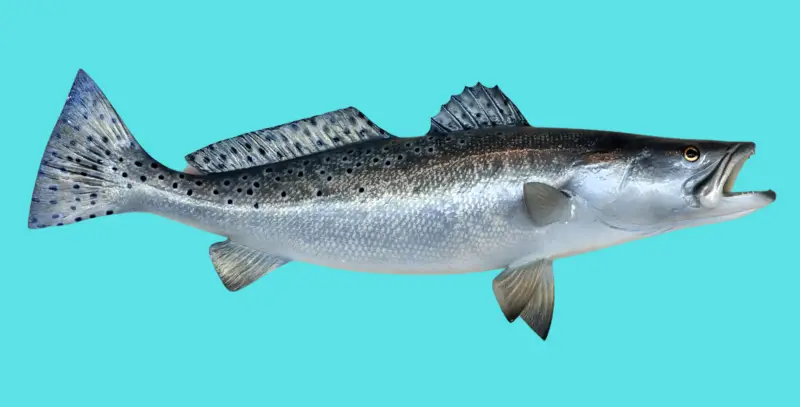How Much Does It Cost To Taxidermy A Fish?
UPDATED 03 NOVEMBER 2023
by Robert Ceran
Have you caught a trophy fish that’s your personal best, and want to get a good mount of it?
In that case you’re probably wondering how much it costs to get a high quality job done.
The price of fish skin mounting varies not only by taxidermist, but also by species, and by size of your fish.

In this article I’ll give you the ballpark range that you can expect if you want to get your trophy fish hung on the wall.
Fish taxidermy prices explained
Mosts taxidermists charge per inch of length when they stuff a fish. Based on the answers we got from contacting 11 taxidermy shops, you can expect to pay the following prices on average:
| Fish species | Price per inch |
|---|---|
| Bass | $11-$15 |
| Walleye | $11-$15 |
| Pike | $11-$15 |
| Trout | $14-$18 |
| Salmon | $14-$18 |
| Striped Bass | $15-$20 |
| Tarpon | $15-$20 |
| Snook | $15-$20 |
| Billfish | $15-$20 |
| Replica fish mounts (all species) | $10-$16 |
You can probably find prices that are higher or lower than the ones quoted above, but these are the commonly charged prices at reputable shops.
But keep in mind: you get what you pay for. A low price deal may result in a low quality job, or one that deteriorates quickly and needs to be restored, which can turn out more expensive than getting it done properly from the start.

You also need to keep in mind that many taxidermists have a minimum charge. So if your fish is on the small side (a panfish, for example), the cost per inch could turn out to be higher since otherwise it wouldn’t be worth their time to stuff it.
Finally, you also have the option of mounting your fish yourself. If this is something you’re interested in, check out our beginner’s guide to fish taxidermy.
The cost of taxidermy depends on the fish type
Taxidermists classify fish in three main groups when it comes to skin mounting:
- Warmwater fish (bass, walleye, pike, etc.): $11-$15/inch
- Coldwater fish (salmon, trout, etc.): $14-$18/inch
- Saltwater fish: $15-$20/inch
Coldwater and saltwater fish are generally more expensive to stuff than warmwater fish, since their skin tends to be more oily, and requires a longer drying process to finish.
Warmwater fish basically include all freshwater game fish, except for salmonid species such as trout, salmon and char, which belong to coldwater fish.
In case you’re not willing to pay that much for getting your fish mounted, you may be interested in our article on how to mount a fish.
Replica fish mounts price
The price of replica fish mounts ranges from $10 to $16 per inch, which is broadly similar to the price of skin mounts (though replica mounts can be slightly cheaper when it comes to mounting coldwater fish or saltwater fish).

But even if replica fish mount price is similar to that of skin mounting, keep in mind that a replica mount requires much less effort, since you just need to shoot a few good photos and record the key measurements of your fish, and then send those to the taxidermist.
Also, since replica creation doesn’t require preserving the fish that you want to get stuffed, you can even release it after catching, and will still get a good model to hang on your wall to remind you of your big moment.
For example, most tarpon anglers will release a giant tarpon after catching it, but they can still get a fish mount made of a trophy fish by recording the length of the fish, and then using that for the replica mount.
Skin mount vs replica: which one should you choose?
There are two main methods to create fish mounts:
The skin taxidermy method involves removing the skin, head and tail of your fish, and then wrapping it around a foam mold that’s similar in size and shape to the original fish.
So, with this method you get an actual physical part of the fish that you caught included in the stuffed version.
Then there is the replica creation method, which basically involves building a highly accurate copy of the fish you caught, but 100% artificial.
This means you just need to provide the correct measurement details of your fish for this method, but not the actual carcass.
You may object that a replica has very little to do with the original fish you caught, but keep in mind that even skin taxidermy is built around a plastic mold, followed by spray painting with artificial colors to replace the natural colors that bleach out during the drying process.
When you look at the work of really good taxidermists, the results of both types of fish taxidermy look astonishingly similar.
So it really comes down to your personal preference when you decide which one to choose.
While a good skin mount may have more sentimental value, since it includes an actual part of the trophy fish you caught, preserving and transporting fish correctly for this process is much more complicated than getting a replica.
How to choose the right taxidermist to mount your fish
The best way to choose a good taxidermist is by getting a close look at their recent work.
You can ask for recommendations from your fishing buddies, and you can post a request for recommendations on angling forums. Whenever someone gives you a recommendation, ask for a photo of the work they got done.
I would say the quality of the work is much more important than the price, since paying $8 per inch instead of $15 is a really bad deal if the result is so shabby that you can’t display it.
Most professional animal stuffers accept fish from all over the country, so you’re not restricted to choosing ones that are based close to you.
What to do if you want to get a fish mounted?
What should you do when you land a trophy fish and decide you want to get it stuffed?
The process depends on which method you choose, and is more complicated if you choose skin mounting, as you’ll need to preserve your fish for taxidermy.
Before you start, choose the “show side” of your fish, which is the one you want to be on display.
It’s essential to keep this side up when you store the fish, to avoid abrasion. And needless to say, avoid damaging the fish in any way, such as bleeding or gutting it.
1. Skin taxidermy:
- Rinse fish
- Wrap in a moist towel
- Put towel-wrapped fish inside a large plastic bag, and tape it shut
- Place whole package inside freezer (with the “show side” facing up)
- Keep in freezer for at least 2 days until it is completely frozen
Once you’ve found the right taxidermist, you can then send the frozen fish to them with a courier service that handles frozen goods.
2. Replica creation:
- Use a tape measure to record the length and girth
- Measure weight (if possible)
- Take as many photos as possible, covering all angles
Once you’ve decided on a shop, you just need to send them the information you collected, and they will take care of the rest.
How long does it take to get a fish mounted?
The length of time it takes to get a fish stuffed varies from 3 months to more than 1 year, with 1 year turnaround time being very common for most shops.
While the minimum time needed can be compressed down to 2 months for some species of fish, the longer periods are mostly due to the fact that good shops have a big backlog of jobs they need to process before they can get to your fish.
Some shops do offer an expedited service, which is worth asking about when you contact them.
The longest part of the whole process is drying the fish, which takes at least 6 weeks for warmwater fish, and a lot longer for coldwater and saltwater fish.
Because of their greasy skin, the latter species need to be dried for a long time to get the job done correctly.
If this process is rushed, the stuffed fish tends to leak oil, which can destroy its appearance.
So it’s definitely worth waiting for the shop to take as long as necessary to guarantee a high quality result, so you can enjoy your trophy for many years to come.
